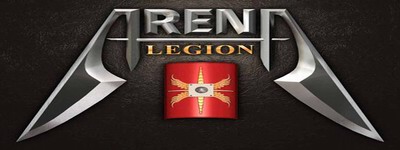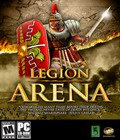Genre: RTS / RPG
Publisher: Strategy First
Developer: Slitherine Software
Release Date: Q4 2005
Legion Arena is for those of you who, like myself, enjoy real-time strategy games, but often find yourselves lost in the midst of minutiae and tedious management. The concept of raising massive armies to send out and conquer the land is one that I find quite intriguing, and the act of conquest is very satisfying. Unfortunately, where I have great vision for strategy and the like (or so I believe), my management skills are sorely lacking, and thus my armies tend to decline into complete disarray only to be decimated by AI on the "Creampuff" setting.
Slitherine Software's upcoming addition to the Legion franchise is Legion Arena, an RTS/RPG hybrid with (supposedly) significant multiplayer capabilities. The game is set during the Roman Empire in its early days, when the fledgling empire first began to significantly expand its borders. In it, we assume the role of a rising general of Rome, sent into the field to command the Roman forces, or we fight as the Celts as they attempt to halt the inexorable expansion of Rome. Legion Arena approaches the RTS genre a little differently from the standard fare by incorporating some role-playing elements into the game mechanics, but more on that later.
The version that I previewed was an early build, but the truly fun aspects are apparent even at this stage of its development. One of the game's greatest strengths is its approach to the idea of "real-time strategy." Gone are the responsibilities for resource collection, research and development, technology trees, and building management. The only resources in Legion Arena are Coin and Fame, used for the purchase and upkeep of units, and the combat units themselves. The player is responsible only for those aspects of a campaign which most concern generals – their men and their strategy. For each successful battle, a general is rewarded with a set amount of Coin and Fame; Coin is used to purchase units and upgrades, while Fame is used to heal units who have lost men in battle.
There is no diplomacy other than victory on the field, and there are no materials besides the lives of your men. Legion Arena is about battle and nothing else. Like any good commander, the game makes sure that the most important items are your combat units.
Real-time strategy titles with role-playing elements are not particularly new, and there are many that have introduced them quite successfully. Legion Arena introduces them in a fairly simple, but very effective manner. As a commander, you must recruit units to fight your battles. These units, when first enlisted, are very inexperienced; in order to advance, they must see action, and the more battles through which they live, the more dangerous they become. As each unit gains experience and levels up, you are presented with choices for enhancements and specialization. Some units can focus on anti-infantry, and some on anti-cavalry, among many more choices. Those units that survive the longest quickly become your most valuable, as hardened veterans can handle nearly any situation.
This approach to unit creation and management, as well as unit growth, is one of the strongest points of Legion Arena. As they progress and grow, you become very invested in your units. They take on some level of personality and are of greater importance than mere fodder to be thrown at the enemy's cavalry. After commanding a few battles and advancing a few units, I felt as if I had raised those men from green, undisciplined slogs into hardened, ordered men. I knew their strengths and weaknesses, where they fought best and where they should not be asked to go. The structure of unit recruitment and advancement puts aside the feelings of anonymity and disconnect I usually experience in RTS games. Not that feeling connected to my nits is necessary for me to enjoy the title, but when it is an integral part of the story, as it is with Legion Arena, it adds a whole new level to the gameplay.
Balanced against the depth of unit development, Legion Arena seems to be designed specifically with the casual gamer in mind. The pace of the game is quite fast, with few breaks between battles. The battles themselves last no longer than 10 to 15 minutes; Slitherine has stated that the title was specifically designed this way to accommodate players with tighter schedules. As a member of that group, I can appreciate the design decisions that were made to enable this kind of play. Getting to the action was streamlined and fast, and the battles themselves quickly became more and more intense as I had to attempt greater sophistication in my strategy.
However, the design also leaves something to be desired. Where the game provides great depth in unit customization, it is lacking something in the immersion of the experience. Hopping from battle to battle is fun at first, but eventually I started looking for something more – more story, more intrigue, more something. Battles began to feel repetitive, and after an extended session I had the feeling, "Haven't I fought this army before?"
Granted, the version I played was an early build. It had a basic story to it, but it was not well developed or presented, and the story is why I play games. Hopefully, Slitherine will do more to include a better sense of story and motivation. Cut scenes and voice acting could go a long way to tying the battles together into a coherent storyline. I sincerely hope they do something, because the story seems like it could be a good one.
Unfortunately, one of the biggest elements of the game, the multiplayer functions, weren't available in this build. Supposedly, one-on-one mode is going to be available, as well as some type of overall ranking system. Additionally, there are rumors that the game will include tools for communication between players even when they are involved in the single-player campaign. We'll have to wait and see how many of these features eventually surface.
Fans of both RTS games and games set in the Roman Empire should find something they like in Legion Arena. The game is fast-paced and ideal for those who can't devote countless hours to a title; you could achieve a good deal in a single lunch hour (not that we endorse gaming on a work machine). The customization options for units provide a great deal of flexibility. What I am most interested to see are how similar units fare against each other in multiplayer, based on the enhancements and specializations that have been selected. With some key additions to the storytelling elements, Legion Arena could be a strong entry into the genre. The game is due out later this year, and you can be sure that I, for one, will be checking out the final product.
More articles about Legion Arena











 "Legion Arena" is a role playing strategy game created on a massive scale, providing gamers with more than just the pure taste of battle. Set during the period of the Roman Republic, players take command of a band of simple peasant warriors and train them into a formidable fighting force. With each victorious battle, gamers can reap the rewards of fame, money and experience along with the opportunity to 'level up' their units. Troops will learn hundreds of new talents through their field experience, and will progressively upgrade their skills with each new combat they face. Gamers can play as the Roman Empire and Celtic Clans through over a hundred scenarios and must use calculated strategies in an attempt to crush their Roman enemies on the front line-Fighting for the pride and glory of the battlefield!
"Legion Arena" is a role playing strategy game created on a massive scale, providing gamers with more than just the pure taste of battle. Set during the period of the Roman Republic, players take command of a band of simple peasant warriors and train them into a formidable fighting force. With each victorious battle, gamers can reap the rewards of fame, money and experience along with the opportunity to 'level up' their units. Troops will learn hundreds of new talents through their field experience, and will progressively upgrade their skills with each new combat they face. Gamers can play as the Roman Empire and Celtic Clans through over a hundred scenarios and must use calculated strategies in an attempt to crush their Roman enemies on the front line-Fighting for the pride and glory of the battlefield!



































